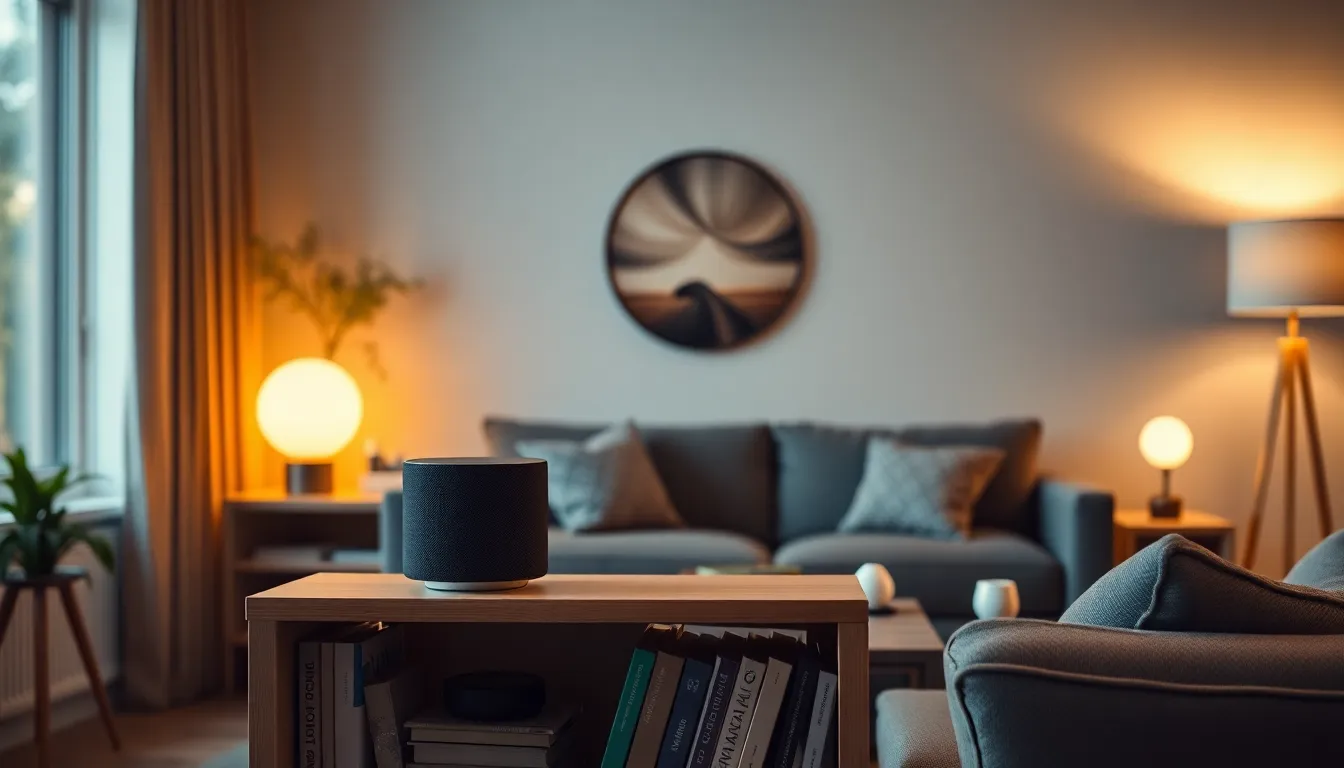Smart speakers have revolutionized the way people interact with technology in their homes. These sleek devices not only play music but also control smart home systems, provide weather updates, and answer questions—all with just a voice command. As they become a staple in modern households, understanding their features and benefits is essential for anyone looking to enhance their living space.
With a variety of options available, from Amazon Echo to Google Nest, choosing the right smart speaker can feel overwhelming. Each model comes packed with unique capabilities designed to cater to different lifestyles. This article dives into the world of smart speakers, exploring their functionalities, compatibility, and how they can simplify daily routines while adding a touch of convenience to any home.
Table of Contents
ToggleOverview of Smart Speakers for Home
Smart speakers enhance home technology, offering various functionalities. They serve as voice-activated hubs for music, information, and smart device control, seamlessly integrating into daily routines.
Definition and Functionality
Smart speakers are internet-connected devices equipped with smart voice assistants. They execute tasks upon receiving voice commands, enabling users to play music, get news updates, set reminders, and control other smart home devices. Their functionality also includes providing weather forecasts, answering trivia questions, and offering multimedia experiences through streaming platforms. Users can interact with these speakers hands-free, enhancing convenience and efficiency in home management.
Popular Brands and Models
Several brands dominate the smart speaker market, each offering unique features.
- Amazon Echo: Known for its versatile Alexa voice assistant, it supports a range of skills and integrates with numerous smart home devices.
- Google Nest: Powered by Google Assistant, it excels in search capabilities and works seamlessly with Google services.
- Apple HomePod: Focused on high-fidelity audio, it uses Siri for voice commands and integrates well with Apple’s ecosystem.
- Sonos One: Combines great sound quality with Alexa and Google Assistant compatibility, appealing to audiophiles seeking smart functionality.
- Bose Home Speaker: Offers premium audio performance and integrates voice control through Alexa and Google Assistant.
Each brand provides various models, allowing consumers to choose based on preferences for audio quality, design, and compatibility with existing smart home systems.
Features to Consider

Smart speakers vary in features, providing essential functionalities for different user needs. Key elements to evaluate include voice recognition technology, compatibility with smart home devices, and audio quality.
Voice Recognition Technology
Voice recognition technology determines how effectively a smart speaker understands and processes voice commands. Look for speakers that utilize advanced algorithms for enhanced accuracy and responsiveness. Some devices support far-field voice recognition, allowing them to capture commands from across the room. Features like multiple language support and voice customization can also improve user experience and accessibility.
Compatibility with Smart Home Devices
Compatibility with various smart home devices is crucial for integrating a smart speaker into an existing ecosystem. Many speakers support protocols like Zigbee or Z-Wave, allowing seamless communication with lights, thermostats, and security systems. Check whether the speaker is compatible with popular brands and platforms, such as Philips Hue or Samsung SmartThings, to ensure a cohesive smart home experience.
Audio Quality
Audio quality significantly impacts the overall user experience. Depending on the intended use, seek speakers with features like high-fidelity sound, rich bass, and room-filling audio. Brands like Sonos and Bose often prioritize superior sound engineering, making them suitable for music enthusiasts. Consider specifications such as speaker size, driver configuration, and support for high-resolution audio formats to make informed choices.
Advantages of Using Smart Speakers
Smart speakers provide numerous benefits that enhance the functionality and ease of using technology in the home. Their convenience, integration, and versatility make them a valuable addition to daily routines.
Convenience and Accessibility
Convenience defines the appeal of smart speakers. They allow users to perform tasks hands-free, making daily activities smoother. Voice commands replace traditional manual inputs, enabling users to set reminders, check calendars, or control lights with simple phrases. Accessibility improves significantly, as individuals with mobility challenges can manage household tasks efficiently. Smart speakers often support multiple voice profiles, recognizing different users and personalizing experiences based on preferences and habits.
Integration with Daily Tasks
Integration simplifies daily tasks through seamless connections with various applications and devices. Smart speakers synchronize with calendars for scheduling reminders or appointments, acting as personal assistants. Users can request information for cooking or everyday tasks, enhancing productivity. Additionally, integrating smart home devices allows users to control temperatures, security systems, and lights effortlessly. This level of automation promotes energy efficiency, as users can manage systems on-the-go or through voice commands, optimizing their home environment effortlessly.
Disadvantages of Smart Speakers
Smart speakers offer numerous benefits, yet they also present certain drawbacks that potential users should consider.
Privacy Concerns
Privacy concerns stand out as a significant issue with smart speakers. These devices continuously listen for voice commands, leading to potential unauthorized data collection and security breaches. Reports suggest that smart speakers may inadvertently record conversations or share information with third parties. Users might encounter risks if they do not adjust privacy settings or fully understand data usage policies enforced by manufacturers. The ability to delete voice recordings and manage privacy settings remains crucial for safeguarding personal information.
Dependency on Internet Connectivity
Dependency on internet connectivity poses a challenge for smart speakers. They require stable internet access to function optimally. In the event of outages or weak signals, these devices lose functionality, limiting access to features like voice commands, music streaming, or smart home control. This reliance highlights the need for a robust Wi-Fi network in households that utilize smart speakers, potentially leading to frustration during connectivity issues. Additionally, users may face limitations when using smart speakers in areas with poor internet service.
Smart speakers are transforming the way people interact with technology in their homes. As they become more integrated into daily routines, understanding their features and benefits is crucial for making informed choices. With options like Amazon Echo and Google Nest, users can find devices that suit their preferences and needs.
While smart speakers offer convenience and versatility, it’s essential to consider privacy and connectivity challenges. By weighing these factors, individuals can enhance their home environment with smart speakers that not only simplify tasks but also elevate the overall living experience. Embracing this technology can lead to a more connected and efficient home.


